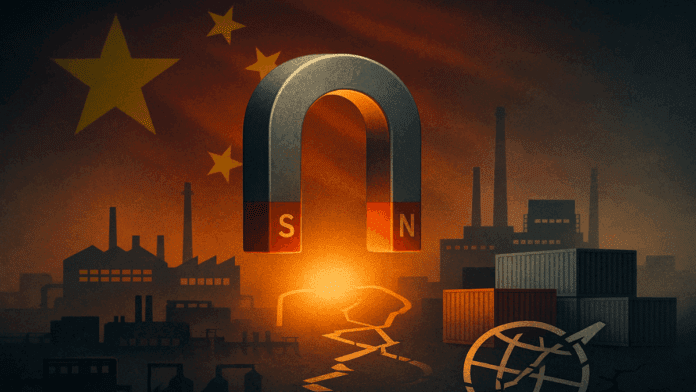China has taken a bold step in the global trade battle — and it’s shaking up the world. This spring, Beijing began limiting exports of rare earth materials and the special magnets made from them. These minerals are essential parts of many modern products, especially in the car industry. Electric vehicles, wind turbines, and even smartphones depend on them.
A New Kind of Trade Weapon
As soon as the restrictions were announced, carmakers across the globe warned of possible factory shutdowns. The reason? They couldn’t get enough rare earth supplies to keep making key parts. These shortages have caused delays and forced companies in countries like India and Japan to slow down production. Even in Europe, leaders are showing concern. One European official even brought a rare earth magnet to a major international meeting, using it as a clear sign of growing dependence on China.
This is not the first time China has used trade as a political tool. But this time, the impact has been far greater. China’s move caused not just economic pain but also led to a major policy change in Washington. The United States had raised tariffs on Chinese goods, hoping to pressure Beijing. But after the rare earth restrictions hit, the U.S. backed off and rolled back some of those tariffs. This shows just how powerful these materials have become in today’s world.
China Willing to Revisit Tariffs, Subsidies in WTO Negotiations with US
China’s Sanctions Are More Targeted Than Ever
In the past, China’s trade punishments were often hard to pin down. Tour groups stopped going to certain countries, or products suddenly faced vague safety issues. But many of these actions didn’t lead to the political results China wanted. Countries like Australia, South Korea, and even the U.S. mostly stood firm.
This time is different. China has created a legal system that lets it control how rare earths are sold and to whom. Not only can it limit exports directly, but it can also tell foreign companies not to use Chinese materials in certain products. That includes items going into U.S. military equipment. This kind of extraterritorial demand — where China tries to control what other countries do with its goods — is a new level of pressure.
The impact is wide. Since the new rules began, China’s rare earth exports have dropped — not just to the U.S., but also to other major buyers like Japan and South Korea. This ripple effect has caused global disruptions. While China may want to focus its actions on the U.S., the nature of rare earths makes that hard. These minerals are often resold through complex global supply chains. Even if China stops selling to the U.S. directly, other countries might still pass along the materials.
Still, the fear and uncertainty have been enough to cause serious reactions. Companies and governments are now scrambling. But China’s strategy shows it knows how much the world relies on its rare earth supply — and it’s not afraid to use that as leverage.
China chokes 80% of India’s fertiliser imports in silent sanctions during peak farming season
The World Was Not Ready
Even though China has used rare earths as a trade tool before — like in 2011 against Japan — many countries did not prepare. Over the last 15 years, governments have talked about finding new sources. They’ve made plans, written strategies, and discussed “critical minerals.” But few followed through with real funding or long-term solutions.
Some steps were taken. Japan helped develop rare earth mines in Australia. South Korea built up emergency stockpiles. But in general, the response has been slow and weak. In fact, some manufacturers only keep a one-week supply of rare earth magnets in storage. That’s shockingly low for materials so vital to modern technology.
This lack of preparation has made China’s actions even more powerful. Many countries and companies are now facing the consequences. It’s not just about losing access to raw materials — it’s about being caught off guard. China didn’t need to make threats or hold big press conferences. All it did was quietly tighten control over a key part of the global supply chain — and the world felt the shock.
This situation highlights the real power of rare earths in global trade today. It’s not about weapons or armies. It’s about resources that every advanced economy needs but only a few control. And right now, China holds the upper hand.
